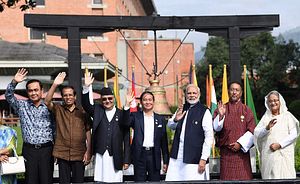The stakes concerning jurisdiction over data have never been higher. There is a global discourse today on the future of data that was recently brought into the news cycle by the U.S. government. The Trump administration was mulling over capping H-1B visas to deter India’s rules on data centers. There is a sense perhaps that data has become a variable in regional and global geopolitics today. Owing to its immense population, India unsurprisingly generates a lot of data. The question for New Delhi is how to translate this into a geopolitical advantage.
China has a robust approach to its data — one that has been conducive to its digital goals. It needs countries to store their data locally. Companies might store their data in China, but can resist sharing user information with the government. Apple has a data center in China, but refuses to share encryption keys with the government. By closing off its data from the world, China lies on an extreme end of the data geopolitical spectrum.
Other countries, such as the United States, Canada, and Australia differentiate their data, some of which is deemed fit to be shared with the world. Critical data, however, is not allowed to cross borders. In cases with a middle ground, data can be shared, but a working copy of it must be maintained at home.
This brings us to India. As data regulation changes from bills to laws, Indian data policy is still officially in flux. Looking at current global trends, India could broadly either go the American or the Chinese way. Maybe New Delhi could pursue the best of both approaches. What these broad approaches might be missing, however, is geopolitical opportunity. Here India could use its data and that of its neighbors’ (BIMSTEC) to their collective advantage.
BIMSTEC is a group comprised of Bangladesh, India, Myanmar, Sri Lanka, Thailand, Nepal, and Bhutan. The group made headlines recently when India invited its members for Prime Minister Narendra Modi’s swearing-in ceremony. This is a good indicator for the relevance of regional groupings, as the SAARC leaders were invited for the same event last time around, in 2014. Combining BIMSTEC with data is a huge opportunity for India. Taking the lead in this regard has a set of technological and geopolitical advantages. This could mean having a common set of data processing laws, common security standards, a common market for data, and a larger region and resources to build data centers in.
Doing all or any one of the above could add importance to BIMSTEC in the region and the world too. The only similar project to exist in the data space is that of the European Union and the Council of Europe. Having a standard of data processing laws and shared space for localization for seven countries would add significant bargaining power against warnings like caps on H-1B visas. Convention 108+ in the EU does something similar. By having common adequacy standards, data can only flow across borders for processing when the receiver/processor meets the standards set for it.
So not only can a combined BIMSTEC approach to data can increase the region’s bargaining power globally, but it can also help better security standards. It is also likely to bring down the costs of storing and maintaining data. Data centers are resource intensive in terms of electricity, water, and bandwidth. Pooling resources to build and maintain them is likely to bring down costs. Should the BIMSTEC area become a cheap option for data centers, it would give the region an increased say in the global technological debate.
Pooling national data can also help the faster development of AI in the region. More importantly, any advancements on AI based on regional data would help develop the technology in the context of developing countries and not just Silicon Valley. It can become hard to relate to AI that can open garage doors for Teslas in South Asia. It would be more useful to have self-driving cars that can deal with potholes, for instance. This would also be good for BIMSTEC enterprises as they use data to solve local problems.
BIMSTEC pooling of data would be tailor-made for AI to solve for regional problems across borders. Also developing new standards for data processing presents a new opportunity. It would bring the privacy debate back into the discourse in these countries. Having a multinational approach to data jurisdictions is not something the world is familiar with—certainly not South Asia. Developing laws that address these issues would be a remarkable achievement considering the unique challenges each country faces.
The bottom line is that in a world of high tech geopolitics, BIMSTEC might be a better approach than India alone. It would undoubtedly provide more power to India and the region. The icing on the cake is that it presents wonderful possibilities for the future of big data and AI in the region. Having a regional approach to local problems, splitting costs of data centers, and the possibility of better processing laws is wonderful. All that remains for India to do is take the lead and add data as a component of foreign policy.
Rohan Seth is a program manager at the Takshashila Institution. Views are personal.

































